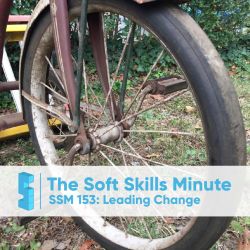Share

Serious Soft Skills
Podcast 2: The Story of Doug, Who Has Poor Soft Skills
•
You may have heard about soft skills, but you may not know who in your office needs to use them and why. We'll explain it all.
Bob Graham ‘0:00': You may have heard about soft skills, but you may not know who in your office needs to use them and why. We will enlighten you in just a few seconds.
Graham ‘0:22': Welcome to Episode 2 of Serious Soft Skills. I am Bob Graham, and with me is Dr. Tobin Porterfield. We each teach college, we collaborate on researching soft skills, and we both have used and seen others use soft skills in various jobs over our careers. We think our experience and expertise give us a unique lens for looking at soft skills. So let’s get to it.
We explained what soft skills were and were not in Episode 1. But before we get to our topic today, let’s answer a few emails we received.
Dr. Tobin Porterfield ‘1:06': It’s always good to hear from our listeners.
Aren’t Soft Skills Just Being Nice To People?
Graham ‘1:09': Tim asked, aren’t soft skills just being friendly and nice to the people you work with? Toby?
Porterfield ‘1:13': Wow. That’s dangerous. While we certainly want to be engaging with people and interested in the people we work with, that’s an oversimplification. That casual smile and looking like you are paying attention are not what we are looking for. When we are talking about soft skills, we are talking about intentionality here. It’s not just being nice, it’s not just being there, but that’s important. It’s the intentionality of engaging in such a way that it enables us to apply our technical skills, our hard skills, in a new way.
Graham ‘2:19': You aren’t saying we shouldn’t be nice. You’re just saying that soft skills are more than just being nice.
Porterfield ‘2:23': That just isn’t going to get us where we need to go at work.
Why Did It Take So Long to Recognize Soft Skills?
Graham ‘2:27': We also have a great question from Kaitlyn. If researchers working with the Army first coined the phrase soft skills in the early 1970s, why did it take so long for people to really start talking about them?
Porterfield ‘2:49': The work for the Army in the early 70s is where they coined that term “soft skills.” I wish I had coined that term myself. It would have been a great thing. They were pretty forward-looking on soft skills. They really were able to grab hold of that. I don’t think we are arguing that soft skills didn’t exist way before the 1970s. People have been working in teams, using listening skills, perseverance. We have a country made of pioneers who persevered and captains of industry who built the economy that we live in today. It comes back to intentionality in what we have seen as we have progressed from the 1970s, the 1980s to today is, as we talked about in Episode 1, the economy has changed, the workplace has changed and there is a need now to approach work in a new way. We have emphasized those hard skills, we have a lot of disciplinary knowledge in so many fields, but those soft skills are what are coming into play today that are making us say, what do we need today to be competitive, innovative. We’ve got the hard skills and soft skills, but how do we mobilize them? That’s where soft skills really are coming into the discussion today.
Graham ‘4:26': I want to thank Tim and Katlyn for their great questions. Keep those questions coming. You can email them to podcast@serioussoftskills.com or tweet them to us at @realsoftskills. We will answer more questions in future episodes.
Which Employees Use Soft Skills?
Graham ‘5:19‘: Now, Toby, let’s talk about which employees have to use soft skills. Is it the leaders, the new employees or only people who have to interact with a firm’s “customers”? I have heard all three of these.
More episodes
View all episodes

SSM 158: Details, details, details
02:05Tobin Porterfield discusses the soft skill of paying attention to details.
75 Coaching With Neal Woodson Part 1
15:45Bob Graham interviews author, trainer, and expert coach Neal Woodson Part 1
SSM 157: Defaulting
03:11Bob discusses the power of defaulting to YES rather than immediately saying NO
SSM 156: Pivoting
03:02Bob Graham discusses how that you need to know when to alter you agenda. Even what works for years may need to change for long term success.


SSM 153: Leading Change
03:08If you are ready for a change - you might have to lead it - on today's podcast
